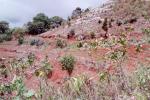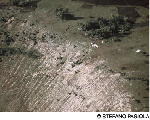Environmental Preservation in Haiti Can't Wait
 Below is an article by Stephen Leahy on environmental degradation in Haiti, which the head of United Nations Development Program (UNDP)/Haiti calls one of the worst case scenarios in the world. While the situation is grave, there is hope. Small organizations such as Floresta have been promoting innovative and replicable solutions such as "living terraces" that promote livelihoods and prevent disasters at the same time. Larger organizations such as the World Bank, the United Nations, and others are developing a three year multi billion dollar Haitian Recovery Framework to be released later this year. The framework would invest unprecedented funds into preserving Haitian watersheds and promoting food security. Engaging the government, involving communities, and ensuring long term support could help halt, and one day reverse, the environmental damage.
Below is an article by Stephen Leahy on environmental degradation in Haiti, which the head of United Nations Development Program (UNDP)/Haiti calls one of the worst case scenarios in the world. While the situation is grave, there is hope. Small organizations such as Floresta have been promoting innovative and replicable solutions such as "living terraces" that promote livelihoods and prevent disasters at the same time. Larger organizations such as the World Bank, the United Nations, and others are developing a three year multi billion dollar Haitian Recovery Framework to be released later this year. The framework would invest unprecedented funds into preserving Haitian watersheds and promoting food security. Engaging the government, involving communities, and ensuring long term support could help halt, and one day reverse, the environmental damage.








